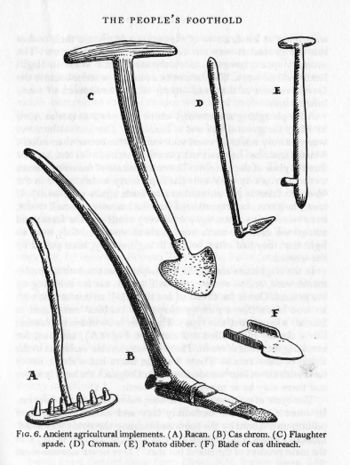Annotation:Flaughter Spade (The): Difference between revisions
m (Text replacement - "<div style="text-align: justify; direction: ltr; margin-bottom: 90px; margin-left: 70px; margin-right: 120px;">" to "<div style="text-align: justify;">") |
No edit summary |
||
| (2 intermediate revisions by the same user not shown) | |||
| Line 1: | Line 1: | ||
---------- | |||
{{TuneAnnotation | |||
= | |f_tune_annotation_title= https://tunearch.org/wiki/Annotation:Flaughter_Spade_(The) > | ||
|f_annotation='''FLAUGHTER SPADE, THE.''' Scottish, Jig (6/8 time). G Major. Standard tuning (fiddle). AABB. The this simple jig (6/8) appears in Scottish amateur violinist and writing master [[biography:David Young]]'s '''MacFarlane Manuscript''' (c. 1741, p. 49), who was living in Edinburgh at the time. | |||
<br> | <br> | ||
<br> | <br> | ||
A Flaughter Spade was the name of a farm implement, from the Teutonic verb to ''flauch'' or remove the skin. It was a form of the Breast Plow, a tool that assisted plowing pushed by an individual's chest or (more typically) hips, [[File:flaughter.jpg|350px|thumb|left|]] and was used to cut turf. The turf was stacked, dried and burnt and the ashes then spread on the fields as a basic fertilizer. | |||
|f_source_for_notated_version= | |||
|f_printed_sources= | |||
|f_recorded_sources= | |||
|f_see_also_listing= | |||
}} | |||
------------- | |||
---- | |||
Latest revision as of 16:13, 11 October 2023
X:1 T:Flaughter Spade, The B:David Young – “A Collection of Scotch Airs with the latest Variations” (AKA - The B:McFarlane Manuscript (c. 1741, No. 24, p. 49) F:https://rmacd.com/music/macfarlane-manuscript/collection/pdfs/the_flaughter_spade.pdf N:The Society of Antiquaries of Scotland M:6/8 L:1/8 K:G d|TB>cd def|ecc ecc|Bcd def|gfe d2:| |:c|BGG BdB|TA2F (A/B/c)A|BGG BdB|cAF G2:|]
FLAUGHTER SPADE, THE. Scottish, Jig (6/8 time). G Major. Standard tuning (fiddle). AABB. The this simple jig (6/8) appears in Scottish amateur violinist and writing master biography:David Young's MacFarlane Manuscript (c. 1741, p. 49), who was living in Edinburgh at the time.


